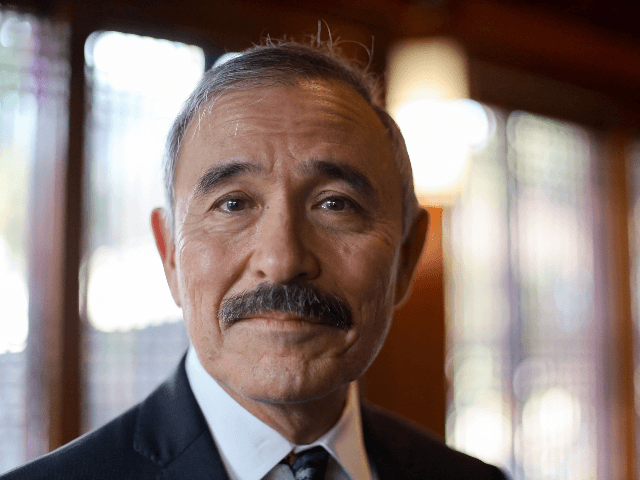The U.S. State Department issued a firm vote of confidence for American Ambassador to South Korea Harry Harris on Monday after he urged Seoul to pause before allowing tourism to North Korea, a remark that rekindled personal attacks on Harris’ mustache for being “too Japanese.”
Harris, a retired admiral and the former head of the Pentagon’s Pacific Command, is ethnically Japanese. In an interview in December addressing the then-simmering controversy of his mustache, he insisted that he grew it as part of a change in his life – not, as the South Korean conspiracy theory goes, to honor imperial Japanese leaders who massacred and enslaved Korean people.
The mustache issue reemerged over the weekend after the leftist government of Korean President Moon Jae-in revealed it is considering a way to permit individual tourism to North Korea, which would technically not violate international sanctions on Pyongyang but provide the communist regime a vital lifeline to continue breaking international law. Harris responded to the remarks urging Seoul to consider talks with the United States, given that American soldiers are stationed in Korea to protect Seoul from Pyongyang, before making any unilateral moves on the matter.
Harris also recently repeated the Trump administration’s request that South Korea invest more in its defense and the presence of American soldiers there. The U.S. has been stationed in Korea since the start of the Korean War in 1950. The Korean War has not technically ended, as neither side has signed a peace treaty, so American troops remain in Korea as part of the armistice agreement that ended active hostilities in 1953.
State Department spokeswoman Morgan Ortagus told South Korea’s Joongang Ilbo in an interview published Monday that Harris “is one of the greatest ambassadors that we have around the world” and that South Koreans criticizing him for assertively defending American interests should note that American soldiers are stationed in Korea to protect them.
“I would remind the people of South Korea that the people of the United States have fought and died and lost their lives and shed blood to make sure that the people of South Korea would have the freedom and choices that [they] have today,” she told the newspaper in the interview, which Joongang noted occurred on Friday. “That’s how committed the people of America are to the people of South Korea. We’re willing to die for you.”
Ortagus’ remarks followed outrage out of Moon’s administration against Harris for criticizing its move seeking to expand tourism to North Korea without violating United Nations sanctions. Pyongyang is under the strictest sanctions regime in that body’s history since its latest nuclear weapons attack in 2017, passed with support from allies China and Russia.
“I think his optimism creates hope, and that’s a positive thing,” Harris said last Thursday in response to Moon Jae-in seeking avenues to generate profit for Pyongyang. “But with regard to acting on that optimism, I have said that things should be done in consultation with the United States.”
Harris suggested joint talks to “avoid a misunderstanding later that could trigger sanctions.”
Seoul called Harris’s comments “very inappropriate” and a challenge to South Korea’s sovereignty.
On Monday, South Korea’s Yonhap news agency reported that Moon administration officials confirmed they would disregard Harris’s advice and continue to seek ways to allow individual tourism to North Korea.
“We are reviewing various options on individual tours to North Korea, including how we will consult with the North over the issue,” a Korean Unification Ministry official told reporters. “There will be matters to be discussed between the governments, including the security issue.”
CNN noted on Friday that official government outrage at Harris paled in comparison to insults on social media largely targeted at his mustache.
“The gist of the criticism is that with the mustache, Harris resembles the reviled Japanese leaders who ruled the Korean Peninsula with an iron fist during the Japanese occupation,” CNN explained. “Some of Japan’s most prominent wartime leaders – like Hideki Tojo, the Prime Minister who was later executed by a postwar tribunal, and Emperor Hirohito – had mustaches.”
The complaint about his mustache is not limited to social media users. Minjoo Party lawmaker Song Young-gil angrily compared Harris to Japanese viceroy to Korea during the occupation of the country by imperial Tokyo.
Harris responded to the mustache criticism in an interview with the Korea Times in December, in which he rejected the notion that the facial hair was a nod to his Japanese heritage or meant as an insult to the Korean people.
“I wanted to make a break, I wanted to make a mental break and a physical break between my life as a military officer and my new life as a diplomat,” he explained. “So I tried to get taller but I couldn’t grow any taller, and so I tried to get younger but I couldn’t get younger. But I could grow a mustache so I did that.”
Harris said he would consider shaving the mustache off if someone could convince him that “somehow the mustache is viewed in a way that hurts our relationship. I’ll note that there are many Korean Independence leaders that have moustaches but no one seems to focus on that. And so I think I’ll keep my mustache.”
“I can’t my deny ethnic background. I can’t hide from it. I am who I am,” he added. “All I can say is that every decision I make is based on the fact that I’m American ambassador to Korea, not the Japanese American ambassador to Korea.”

COMMENTS
Please let us know if you're having issues with commenting.